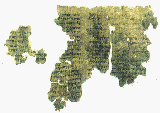Enoch
Hanokh
Fragment A height 17.5 cm (6 7/8 in.), length 17.5 cm (6 7/8 in.)
Fragment B height 6.4 cm (2 1/2 in.), length 6.9 cm (2 11/16 in.)
4Q 201 (En ara)
Parchment
Copied ca. 200—150 B.C.E.
Courtesy of the Israel Antiquities Authority (11)
One of the most important apocryphic works of the Second Temple Period is Enoch. According to the biblical narrative (Genesis 5:21-24), Enoch lived only 365 years (far less than the other patriarchs in the period before the Flood). Enoch "walked with God; then he was no more for God took him."
The original language of most of this work was, in all likelihood, Aramaic (an early Semitic language). Although the original version was lost in antiquity, portions of a Greek translation were discovered in Egypt and quotations were known from the Church Fathers. The discovery of the texts from Qumran Cave 4 has finally provided parts of the Aramaic original. In the fragment exhibited here, humankind is called on to observe how unchanging nature follows God's will.
The Book of Enoch is a pseudoepigraphal work (a work that claims to be by a biblical character). The Book of Enoch was not included in either the Hebrew or most Christian biblical canons, but could have been considered a sacred text by the sectarians. The original Aramaic version was lost until the Dead Sea fragements were discovered.
Reference:
Milik, Jazef. T., ed. The Books of Enoch: Aramaic Fragments of Qumran Cave 4 (Oxford, 1976) Printed book. General Collections, Library of Congress.
English Translation of Enoch (Hanokh)
4Q 201 (En ara)
Courtesy of the Israel Antiquities Authority (11)
Ena I ii
12. ... But you have changed your works,
13. [and have not done according to his command, and tran]sgressed against him; (and have spoken) haughty and harsh words, with your impure mouths,
14. [against his majesty, for your heart is hard]. You will have no peace.
Ena I iii
13. [They (the leaders) and all ... of them took for themselves]
14. wives from all that they chose and [they began to cohabit with them and to defile themselves with them];
15. and to teach them sorcery and [spells and the cutting of roots; and to acquaint them with herbs.]
16. And they become pregnant by them and bo[re (great) giants three thousand cubits high ...]
Transcription by J. T. Milik, amended by J. C. Greenfield; translation by J. C. Greenfield.
